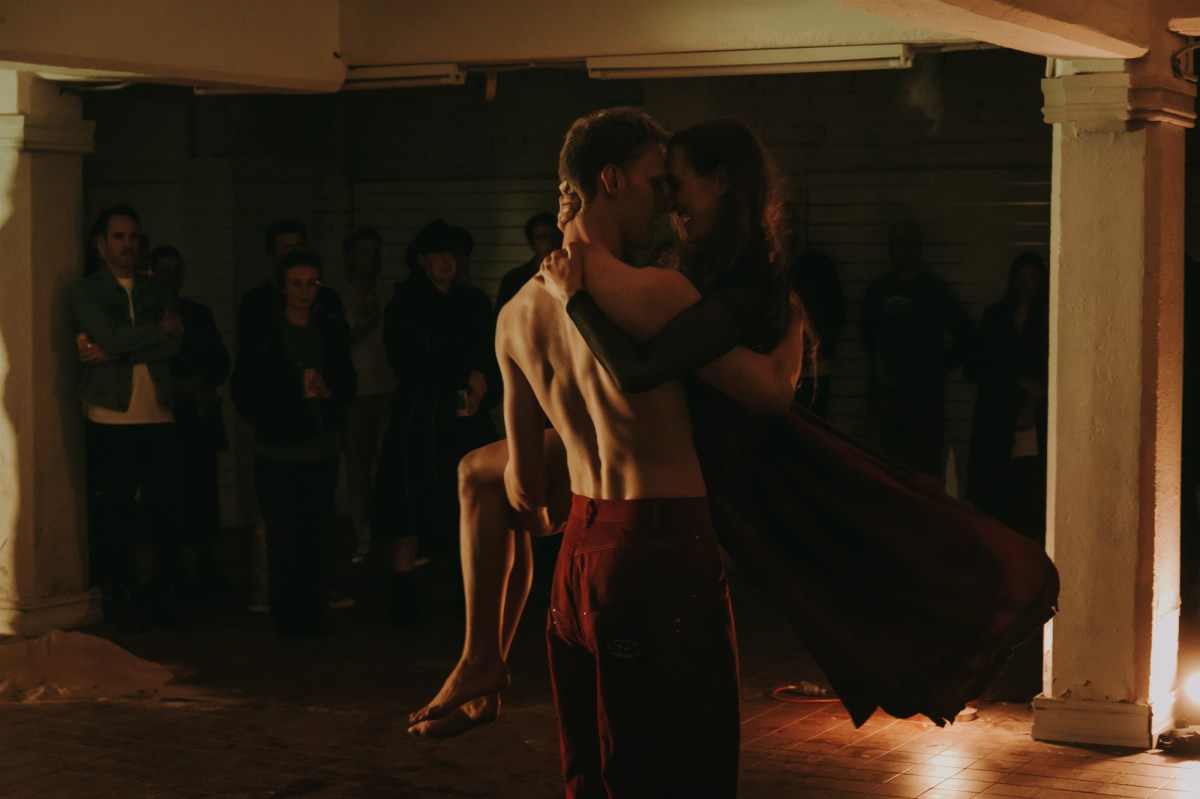Created by independent Melbourne-based theatre collective Liminal Space, this reimagining of Biblical stories featured strong performances by the 15-member ensemble cast. The design was thick with symbolism, and the sound and visual effects were excellent. But … isn’t there always a ‘but’?
The two linked works, Creation and Passion (based on the Old and New testaments respectively), deliver a heady mixture of discreet scenes, performance art-esque vignettes and monologues while deploying the cast in various combinations.
A clear standout in part 1, Creation, was the tale of Cain and Abel, portrayed as playful wrestling match between the two actors (Basil Sikiotis and Tom Richards) while they discuss the merits of various cheeses. It was welcome comic relief in what, for all the Bible’s merits, is rarely considered jokey source material. Abel’s death scene was also one of the most visually interesting, bright orange paint under UV lights gushing from his body against a caliginous background.
In part 2, Passion, a silver gown-clad Jesus (an ethereal gender-fluid leader of outcasts played by actor Nicholas Carr) emerged early in the piece, while the story of his mother, Mary, was portrayed as one of accidental pregnancy and bloodied birth. The sexual relationship between Jesus and Mary Magdalene was explored in a dirty room and, as is often the way, we ended with the crucifixion of Jesus.
Between acts, ushers in orange overalls guided the audience to their next berths – smaller rooms, larger rooms, stairwells, bathrooms, and so on.
The minimalist design and scenography by Juliette Whitney was visually and conceptually strong. Working with the raw materials of Testing Ground, an empty multi-storey close to Melbourne’s Queen Victoria Market, simple choices were used to great effect. ‘God is Love’ was blazoned in large graffiti across one wall, festoon lighting hung from the ceiling, and smaller niche spaces set into unfinished drywall provided arresting frames for actors. Use of sand (in Creation) and dirt (in Passion) lent powerful symbolism to scenes. That said, the stripped-back nature of it all clashed with what was billed as being an ‘immersive’ experience.
More than once, we were told we could choose how much or how little we wanted to engage with the work, but the linear nature of Mysteries – one leading to the next chronologically, essentially meant we had to just take what we were given. Occasionally, one or two spectators chose to step into the actors’ space only to awkwardly retreat. The fourth wall, though invisible, remained firmly in place as the actors did their thing, seemingly oblivious to the audience.
At one point, I was a metre away from an actor (Theresa Angela) in a stairwell, as she performed a deeply embodied, impressive and authentic monologue. And yet I left feeling untouched, as if she was in a world to which none of us had access and from which she couldn’t see or connect with us, despite the creaking stairs and whispered apologies as the cramped audience shifted around her uncomfortably.
That wasn’t always the case. In one of the smaller spaces, I sat next to another actor, Rebekah Carton, who – as Eve – engaged with the audience, imploring us in to share in her moment of grief and sadness. Here, it worked. But I wanted more.
Given its source material, Mysteries had the potential to be blistering and wildly exciting, but I was left feeling that the overall experience was unfinished. It felt like experimental source material stitched together from ad-libbed theatrical exercises rather than fully realised theatre, a terrific idea in need of a firmer directorial hand.
While individually strong as actors – Bonnie Roberts’ Lilith was a standout – as an ensemble, the lack of diversity meant that the material (which seemed drawn from each actors’ response to thematic stimuli) quite often had a samey quality.
The works seemed largely hampered by their linear structure. If the ambition was for Mysteries to be ‘fully immersive’, as the program indicated – a non-linear structure would have enabled the audience to more freely explore the different rooms and spaces to encounter performances.
Read: Theatre review: The Tempest, Sydney Theatre Company
A set-up that allowed the audience to move around freely and interact, in the vein of Malthouse Theatre’s Because the Night or Broad Encounter’s A Midnight Visit, would have delivered on the promise of immersive theatre. Yes, there were moments of grace and transcendence, but I found myself praying for more.
Mysteries: Creation and Passion by Liminal Space
Testing Grounds, Melbourne
Concept and Direction: Harry Haynes
Design and Scenography: Juliette Whitney
Assistant Director: Thomas Noak
Produced by The Liminal Space
Executive Producer Testing Grounds
Cast: Theresa Angela Rosa Ablett-Johnstone, Delta Brooks, Nicholas Carr, Cassiel Garward, Lachlan Hamill, Kiara Nickson, Tom Richards, Bonnie Roberts, Konstantina Samartzis, Basil Sikiotis, River Stevens, Lily Thomson, James Till, Rebekah Carton,
Mysteries: Creation and Passion were performed from 10–20 November, 2022.





